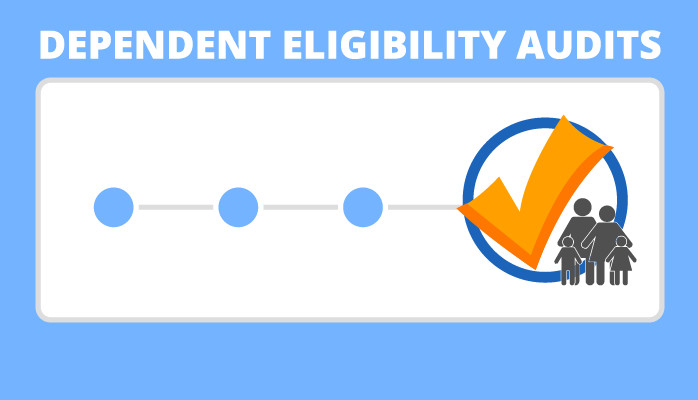How to make dependent eligibility audits run smoothly
There’s no doubt dependent eligibility verification is important.
Employers can save their companies thousands of dollars by conducting regular dependent eligibility audits. This is a process where employees submit documentation to verify that the people covered on their health insurance plan still qualify for coverage. Ineligible dependents who do not meet the requirements for health care coverage are removed from the employer’s plan. This process saves employers a lot of money on employee premiums.
Audits can also help companies avoid the risk of violating IRS regulations by providing health coverage to ineligible dependents, the Society for Human Resource Management reported. In fact, third-party providers of eligibility audits report that as many as 10 percent of people receiving coverage have been ineligible in the past few years, SHRM reported. But this process can be confusing and intimidating to some employers who might not know what to do when verifying benefits coverage or how to communicate its purpose to workers.
Here are some pointers to ensure employers don’t encounter any problems as they go through this important process:
When should my company conduct an audit?
How often a business owner should consider a dependent audit depends on a variety of factors, including the rate of company turnover, the size of the business and the type of health care plan it offers employees.
For those with a low turnover, it shouldn’t be necessary to conduct an eligibility audit more than once every three years, according to Employee Benefits Adviser. But companies that have people coming and going at an above average rate should consider implementing audits on an annual or every other year basis. This will ensure new employees and their dependents are in compliance with coverage guidelines and help reduce costly coverage for those who don’t qualify for it.
During this stage, it’s also crucial to convey why this process is important for the company. In certain cases, employees can be resentful of the verification process because they see it as employers not wanting to offer health insurance to their significant others.
It’s critical for business owners to communicate that these audits are in the best interest of the company and further business and employee well-being for the long term. For instance, employers should say that if ineligible individuals are no longer covered, health care premiums will go down, which means less out-of-pocket expenses for both employers and employees.
Before an audit begins, employers should look over any company health plan documents – such as the summary plan description – in addition to any other relevant enrollment materials, according to Smart Business.
What do my employees need for an audit?
To start the process off on the right foot, employers need to clearly communicate what is expected of workers while an audit is being completed. During this process, employees will be asked to turn over documentation that verifies the employee’s relationship to their dependents. Employees might be asked to procure documents such as marriage certificates, mortgage or lease agreements or birth certificates among other paperwork depending on who is considered a dependent on the worker’s plan.
The clearer an employer is about what documentation is needed to conduct the audit, the more streamlined the process can be for everybody involved. The amount of time it takes to complete dependent eligibility verification will vary company to company, but employers should prepare for the process to last up to several months. Business owners also need to decide if they are handling the audit internally or if they will need to contract with an outside vendor to get the job done.
What happens after the audit?
Once the results of an audit have come in, employers can determine who is still eligible for coverage and who will be taken off the company’s health insurance plan. Dependents can be found ineligible for a number of reasons, and often it’s simply because an employee didn’t fully understand the requirements for coverage. It’s important to communicate the overall benefits of conducting an audit and to educate employees so they understand which dependents are eligible going forward.
Although there are clear cost-saving benefits to audits, business owners need to take special care to ensure that audits are done as efficiently and accurately as possible.
Secova offers companies of all sizes a team of experienced professionals who can lead business owners through the audit process should they decide their business needs one.


We wanted to see if your dependent eligibility verification process is user friendly and automated. Also wanted to know if your process is compatible with Oracle cloud system. Thanks Kenny